|
|
|
Sort Order |
|
|
|
Items / Page
|
|
|
|
|
|
|
| Srl | Item |
| 1 |
ID:
081360
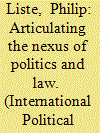

|
|
|
|
|
| Publication |
2008.
|
| Summary/Abstract |
Does law rule foreign affairs in the democratic state? Basically, one might expect that democratic executives operate on the ground of what is called the Rechtsstaat, and that in a political system with checks and balances operations-especially those eventually dropping out of that ground-are subject to judicial review. However, legal systems are more often than not willing to abstain from a legal governance of its countries' foreign policy-because of "political reasons." Moreover, democracies obviously vary according to their legal operations. At least in the area of foreign affairs, the relationship of democracy and law does not take up a necessary character. Facing this contingency, the article engages in the discursive construction of a politics and law nexus in the course of the operations of two legal systems, in the United States and Germany. For that reason, it will proceed by deconstructing two legal decisions related to the war in Iraq. Building upon the premise that legal practices are intertwined into a larger web of (legal) text, the article argues that the possibility of a judicial abstention in cases bearing reference to foreign policy issues depends on meaning produced in the course of the signification and positioning of discursive elements like "politics" and "law." Thus, speaking law is a politico-legal practice
|
|
|
|
|
|
|
|
|
|
|
|
|
|
|
|
| 2 |
ID:
131389


|
|
|
|
|
| Publication |
2014.
|
| Summary/Abstract |
Under what conditions do regional security organizations (RSOs) take up a broader agenda or scope in security governance? Further, does broader scope matter for regional security? These questions are addressed using a quantitative comparative analysis of 25 RSOs over the period 1990-2009. Similarity among members in their capacities and political systems are identified as two central conditions for increased scope. In contrast, hegemony is not a significant factor. Institutionalization also seems to matter: RSOs that have been around longer and encompass more members are more successful in expanding their security agenda. There is only weak empirical support for the idea that RSOs with a broader scope have a stronger pacifying effect on regional security. The implications of these findings are discussed in greater detail for Asian RSOs, which have only limited scope and operate in comparatively high levels of insecurity. However, except from the legacy of conflict, variables identified in the general models apply similarly to Asia.
|
|
|
|
|
|
|
|
|
|
|
|
|
|
|
|
| 3 |
ID:
079545
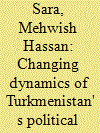

|
|
|
| 4 |
ID:
114771
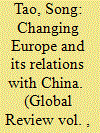

|
|
|
| 5 |
ID:
130958
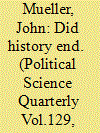

|
|
|
|
|
| Publication |
2014.
|
| Summary/Abstract |
IN A 1989 ESSAY, FRANCIS FUKUYAMA ADVANCED the notion that, with the death of communism, history had come to an end.1 This somewhat fanciful, and presumably intentionally provocative, formulation was derived from Hegel, and it has generally been misinterpreted. He did not mean that things would stop happening-obviously a preposterous proposal.2 Rather, he contended that there had been a profound ideological development. With the demise of communism, its chief remaining challenger after the extinguishment earlier in the century of monarchy and Fascism, liberalism-democracy and market capitalism-had triumphed over all other governmental and economic systems or sets of ordering principles. Looking for future challenges to this triumph, he examined the potential rise of destructive forms of nationalism and of fundamentalist religion, but found them unlikely to prevail. Thus, the triumph of liberalism was likely to be permanent.
This article evaluates developments over the subsequent quarter century and argues that Fukuyama seems to have had it fundamentally right. Beginning with the countries of Eastern Europe, democracy continued its progress after 1989. Moreover, capitalism increasingly came to be accepted, so that when the world plunged into widespread economic crisis after 2007, proposed remedies variously recommended tinkering with the system, not abandoning it.
In the meantime, violent forms of nationalism that surged in some places in the last decade of the old century scarcely proved to be much of a challenge to these trends, and the same seems likely to hold for violent forms of fundamentalist religion that surged in some places in the first decade of the new one. In fact, the significance of both of these illiberal developments seems to have been much exaggerated.
In addition, there was a striking decline of civil warfare during the decade after 1989 to low levels that have held now throughout the new century.
|
|
|
|
|
|
|
|
|
|
|
|
|
|
|
|
| 6 |
ID:
124480
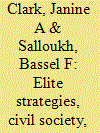

|
|
|
|
|
| Publication |
2013.
|
| Summary/Abstract |
This article explains the endurance of sectarian identities and modes of political mobilization in Lebanon after the civil war. This is done by examining three case studies that demonstrate a recursive relation between sectarian elites and civil society actors: on one side of this relation, sectarian elites pursue their political and socioeconomic interests at the expense of civil society organizations (CSOs); on the other side, civil society actors instrumentalize the sectarian political system and its resources to advance their own organizational or personal advantage. These mutually reinforcing dynamics enable sectarian elites to penetrate, besiege, or co-opt CSOs as well as to extend their clientelist networks to CSOs that should otherwise lead the effort to establish cross-sectarian ties and modes of political mobilization or that expressly seek to challenge the sectarian system. The article fills a gap in the literature on sectarianism in postwar Lebanon and helps explain a puzzle identified by Ashutosh Varshney in the theoretical debate on ethnic conflict, namely the reasons behind the "stickiness" of historically constructed ethnic identities
|
|
|
|
|
|
|
|
|
|
|
|
|
|
|
|
| 7 |
ID:
000392


|
|
|
|
|
| Publication |
Shimla, Indian Institute of Advanced Technology, 1995.
|
| Description |
239p.
|
|
|
|
|
|
|
|
|
|
|
|
Copies: C:1/I:0,R:0,Q:0
Circulation
| Accession# | Call# | Current Location | Status | Policy | Location |
| 041689 | 321.02/NAR 041689 | Main | On Shelf | General | |
|
|
|
|
| 8 |
ID:
139806
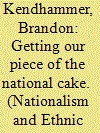

|
|
|
|
|
| Summary/Abstract |
Although consociational-style ethnic power-sharing arrangements are frequently adopted in postconflict African states, their track record is spotty at best. Using post-civil war Nigeria (one of Africa's most durable experiments with ethnic proportionality in government), I argue that the failure of formal ethnic power-sharing in Africa is due to its intersection with the largely informal power-sharing practices characteristic of neopatrimonial political systems. In Nigeria, well-intentioned policies meant to ensure ethnic proportionality reinforce the power of patronage networks that also rely on ethnic and kinship mobilization to capture state resources. As a result, entrenched ethnic power sharing in Nigeria's federal constitution since the late 1970s has played a key role in the country's descent into corruption and poor governance.
|
|
|
|
|
|
|
|
|
|
|
|
|
|
|
|
| 9 |
ID:
083259
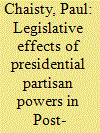

|
|
|
| 10 |
ID:
130629
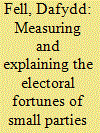

|
|
|
|
|
| Publication |
2014.
|
| Summary/Abstract |
Over the last two and half decades the Kuomintang and Democratic Progressive party have dominated Taiwan's party system. From 2008-2012 they were the only parties represented in the Legislative Yuan. Nevertheless, there have been periods in which other parties have had a significant impact on the party system. These parties have received considerable media attention during and between campaigns, won significant members of parliamentary and local assembly seats, and affected the Taiwanese political agenda. In this paper I assess the impact of these small parties on the party system and offer some explanations for their electoral successes and failure over the last decade.
|
|
|
|
|
|
|
|
|
|
|
|
|
|
|
|
| 11 |
ID:
074852
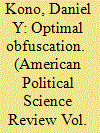

|
|
|
|
|
| Publication |
2006.
|
| Summary/Abstract |
A growing body of research shows that democracies have more liberal trade policies than do autocracies. I argue, in contrast, that democracy has contradictory effects on different types of trade policies because electoral competition generates more information about some than about others. It generates considerable information about policies whose effects on consumer welfare are easy to explain to voters, but less information about policies whose effects are more complex. By increasing the transparency of some policies relative to others, democracy induces politicians to reduce transparent trade barriers but also to replace them with less transparent ones. I test this hypothesis by examining the impact of democracy on tariffs, "core" nontariff barriers (NTBs) such as quotas, and "quality" NTBs such as product standards in 75 countries in the 1990s. I find that democracy leads to lower tariffs, higher core NTBs, and even higher quality NTBs. I conclude that democracy promotes "optimal obfuscation" that allows politicians to protect their markets while maintaining a veneer of liberalization.
|
|
|
|
|
|
|
|
|
|
|
|
|
|
|
|
| 12 |
ID:
125523
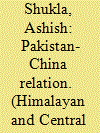

|
|
|
|
|
| Publication |
2013.
|
| Summary/Abstract |
There is hardly any doubt that the contemporary world recognises not only the hard currency of military power of the states but their economic foundations is also taken into account while calculating their respective power and influence in the international system. There are various schools of thought that explain the very nature of international system and the behavior of the states as well.
|
|
|
|
|
|
|
|
|
|
|
|
|
|
|
|
| 13 |
ID:
147248
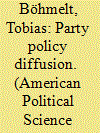

|
|
|
|
|
| Summary/Abstract |
Do parties learn from or emulate parties in other political systems? This research develops the argument that parties are more likely to employ the heuristic of learning from and emulating foreign successful (incumbent) parties. Spatial-econometric analyses of parties’ election policies from several established democracies robustly confirm that political parties respond to left-right policy positions of foreign political parties that have recently governed. By showing that parties respond to these foreign incumbent parties, this work has significant implications for our understanding of party competition. Furthermore, we contribute to the literature on public policy diffusion, as we suggest that political parties are important vehicles through which public policies diffuse.
|
|
|
|
|
|
|
|
|
|
|
|
|
|
|
|
| 14 |
ID:
060845
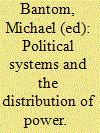

|
|
|
|
|
| Publication |
London, Tavistock Publications, 1965.
|
| Description |
xlii, 142p.
|
|
|
|
|
|
|
|
|
|
|
|
Copies: C:1/I:0,R:0,Q:0
Circulation
| Accession# | Call# | Current Location | Status | Policy | Location |
| 002320 | 306.2/BAN 002320 | Main | On Shelf | General | |
|
|
|
|
| 15 |
ID:
031399


|
|
|
|
|
| Publication |
New York, Holt, Rinehart and Winston, 1969.
|
| Description |
xi, 305p.
|
|
|
|
|
|
|
|
|
|
|
|
Copies: C:1/I:0,R:0,Q:0
Circulation
| Accession# | Call# | Current Location | Status | Policy | Location |
| 002512 | 320.019/RIE 002512 | Main | On Shelf | General | |
|
|
|
|
| 16 |
ID:
172413
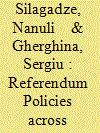

|
|
|
|
|
| Summary/Abstract |
This article compares the use of referendums across political regimes over time in Europe. It does so on the basis of a new typology that differentiates between policy domains and degrees of abstraction. The analysis shows different patterns in referendum use between authoritarian regimes, countries in transition and democracies. In addition to the variation in policy domains, the findings indicate different institutional features within the polity types: the process of initiation, the turnout in referendums and the rate of approval. The empirical evidence draws on an original dataset of 620 referendums organised at national level in Europe between 1793 and 2017.
|
|
|
|
|
|
|
|
|
|
|
|
|
|
|
|
| 17 |
ID:
129297
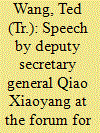

|
|
|
|
|
| Publication |
2012.
|
| Summary/Abstract |
The article presents a speech by Qiao Xiaoyang, Deputy Secretary General, delivered at the Forum for All People in Macao in which he discussed the political system of Macau, the establishment of the executive council in 2013, and provisions of the basic law in the Special Administrative Region (SAR).
|
|
|
|
|
|
|
|
|
|
|
|
|
|
|
|
| 18 |
ID:
189888
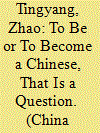

|
|
|
|
|
| Summary/Abstract |
China is its history. In its long history of changes, we can see a more stable "methodological China" compared to the often-changing Chinese values and beliefs. It means China exists in its flexible ways of thinking and doing rather than in any unchangeable fundamentalist faiths. "Methodological China" refers to "exemplars," "political systems," "history-based civilization," "unchanged samples," as well as the "episteme of Chinese mind."
|
|
|
|
|
|
|
|
|
|
|
|
|
|
|
|
| 19 |
ID:
130250
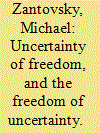

|
|
|
|
|
| Publication |
2014.
|
| Summary/Abstract |
It likely has occurred to everyone at least once that it would be a wonderful thing to win the lottery. And many of us have indeed bought a lottery ticket at least once in our lives, only to validate the well-known fact that the chances of winning in a lottery are rather small. Some of us, though, may have not put up with this sober conclusion and proceeded on the assumption that if we bought two tickets our chances of winning the lottery would increase twofold, and then perhaps extrapolated the logic to three, five, or even ten tickets. And a few of us might have even entertained the theoretical possibility that if we bought all the tickets we would be assured of winning the lottery. There is nothing wrong with dreaming of a stroke of luck and trying to maximize one's chances. But it also pays to use common sense and elementary knowledge of the probability calculus. Buying all the lottery tickets will not only give you an absolute certainty of winning but also an absolute certainty of losing vast amounts of money in the process.
But what, one may ask, does buying a lottery ticket have to do with freedom? Freedom, after all, is arguably not an outcome of a random process like winning in a lottery. It is a conscious choice to believe that men are born with certain inalienable rights and should be thus free to make decisions about their lives. Based on this belief, we build the institutions of a free society, provide them with the necessary checks and balances, and guarantee the rule of law to prevent arbitrary punishment and thwart attempts to hijack our freedom. For all the problems of a free society, we believe with Winston Churchill that democracy, the political system that embodies, maintains, and administers a free society, is vastly preferable to all the alternatives. Living in a democracy, we believe that we have hit the jackpot in the lottery of political systems.
|
|
|
|
|
|
|
|
|
|
|
|
|
|
|
|
| 20 |
ID:
129284
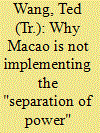

|
|
|
|
|
| Publication |
2012.
|
| Summary/Abstract |
The article presents a speech by Zhang Xiaoming, Deputy Director of the Hong Kong and Macao Affairs Office of the State Council, delivered at the High-Level Seminar on Macao's Basic Law on July 20, 2011, in which he discussed the separation of powers, the government of the Special Administrative Region (SAR), and legislative power practice.
|
|
|
|
|
|
|
|
|
|
|
|
|
|
|
|
|
|
|
|
|